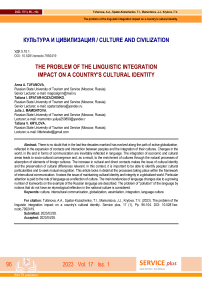The problem of the linguistic integration impact on a country's cultural identity
Автор: Tufanova A.A., Spatar-kozachenko T.I., Mamontova J.J., Krylova T.V.
Журнал: Сервис plus @servis-plus
Рубрика: Культура и цивилизация
Статья в выпуске: 1 т.17, 2023 года.
Бесплатный доступ
There is no doubt that in the last few decades mankind has evolved along the path of active globalization, reflected in the expansion of contacts and interaction between peoples and the integration of their cultures. Changes in the world, in life and in forms of communication are inevitably reflected in language. The integration of economic and cultural areas leads to socio-cultural convergence and, as a result, to the enrichment of cultures through the natural processes of absorption of elements of foreign cultures. The increase in cultural and direct contacts makes the issue of cultural identity and the preservation of cultural differences relevant. In this context, it is important to be able to identify peoples' cultural particularities and to seek mutual recognition. This article looks in detail at the processes taking place within the framework of intercultural communication. It raises the issue of maintaining cultural identity and integrity in a globalized world. Particular attention is paid to the role of language as a reflection of culture. The main tendencies of language changes due to a growing number of loanwords on the example of the Russian language are described. The problem of "pollution" of the language by notions that do not have an etymological reflection in the national culture is considered.
Culture, intercultural communication, globalization, assimilation, integration, language culture
Короткий адрес: https://sciup.org/140299771
IDR: 140299771 | DOI: 10.5281/zenodo.7992419
Список литературы The problem of the linguistic integration impact on a country's cultural identity
- Arutyunova, N.D. (1998). Yazyk i mir cheloveka [Language and the human world]. Moscow: Yazyki russkoy kultury1999. (In Russ.).
- Hall, E. T. (1976). Beyond culture. Garden City, New York: Anchor Press. URL: https://archive.org/details/be-yondculture0000hall/page/n5/mode/2up (Accessed on April 15, 2023).
- Ikonnikova, N.K. (1995). Mekhanizmy mezhkulturnogo vospriyatiya [Mechanisms of intercultural perception]. Sociologicheskie issledovaniya [Sociological Studies], 11, 26-34. (In Russ.).
- Leontiev, A.A. (2005). Osnovy psikholingvistiki : ucheb. dlya studentov vuzov, obuchayushchikhsya po spe-cialnosti "Psikhologiya" [Fundamentals of psycholinguistics : textbook for university students studying in the specialty "Psy-chology"]. Moscow: Academi: Smysl. (In Russ.).
- Leontiev, A.A. (1993). Yazykovoe soznanie i obraz mira [Language Consciousness and World View]. In: Yazyk i soznanie: paradoksalnaya realnost [Language and Consciousness: paradoxical rationality]: a monograph. Mos-cow: Russian Academy of Sciences Institute of Linguistics. (In Russ.).
- Oshchepkova, V.V. (1990). Pedagogicheskaya terminologiya v pyati stranakh angliyskogo yazyka [Pedagog-ical terminology in the five countries of the English language]. Inostranniy yazik v shkole [Foreign language at school], 1, 84-90. (In Russ.).
- Petrenko, V.F., Alieva, L.A. (1988). Stereotipy povedeniya kak element nacionalnoy kultury [Stereotypes of behaviour as an element of national culture] In: Yazykovoe soznanie: stereotipy i tvorchestvo [Linguistic consciousness: stereotypes and creativity]. Moscow: Russian Academy of Sciences Institute of Linguistics, 16-39. (In Russ.).
- Shmelev, A.D. (2002). Russkaya yazykovaya model mira : Materialy k slovaryu [Russian linguistic model of the world. Materials for the dictionary]. Мoscow: Languages of Slavic culture.
- Stefarenko, T.G. (2004). Etnopsikhologiya [Ethnopsychology]. Мoscow: Aspekt Press. (In Russ.).
- Van Dyck, T.A. (1989). Yazyk. Poznanie. Kommunikaciya [Language. Cognition. Communication]. Moscow: Progress. (In Russ.).
- Wierzbicka, A. (1996). Yazyk. Kultura. Poznanie [Language. Culture. Cognition]. Moscow: Russian dictionar-ies. (In Russ.).


